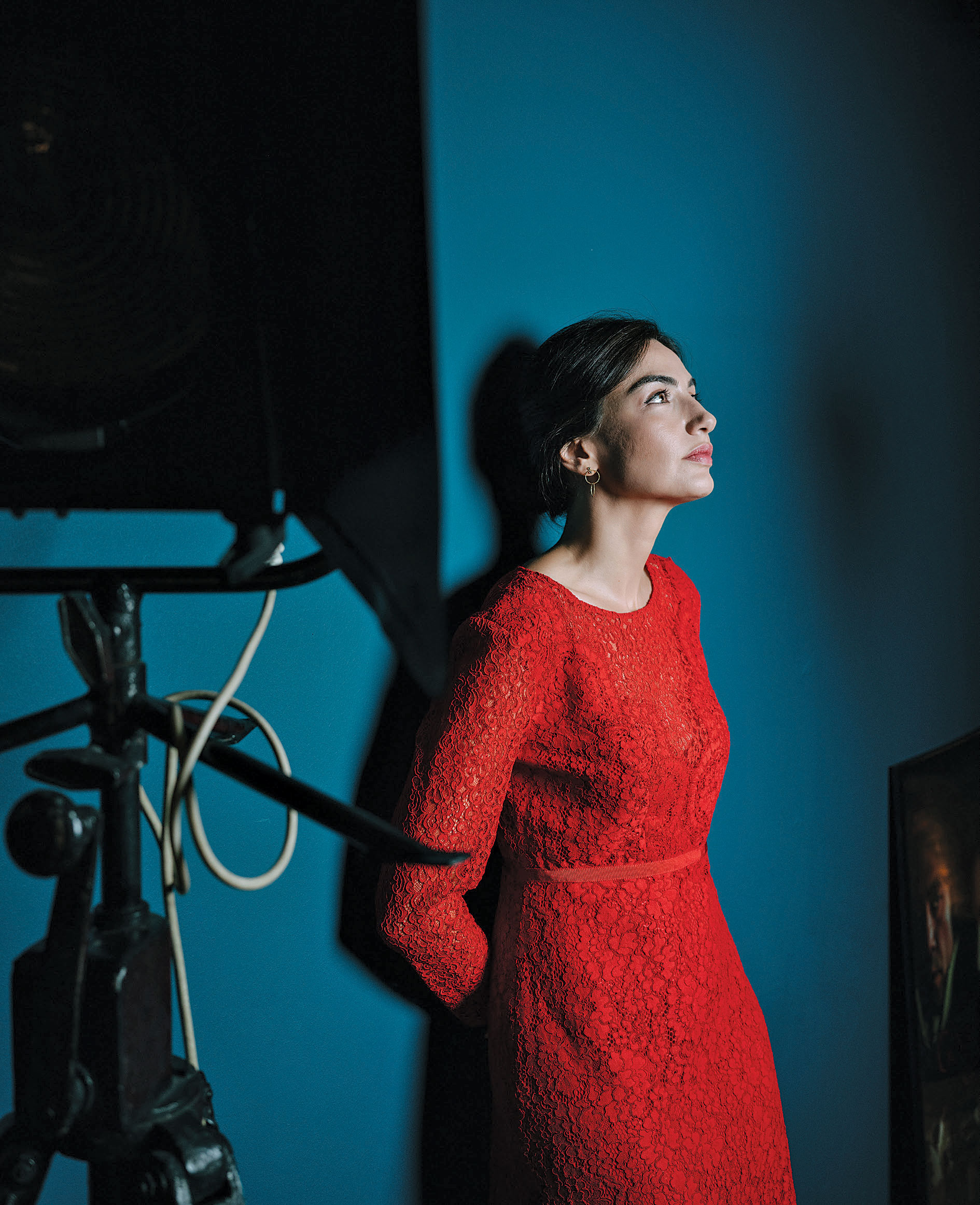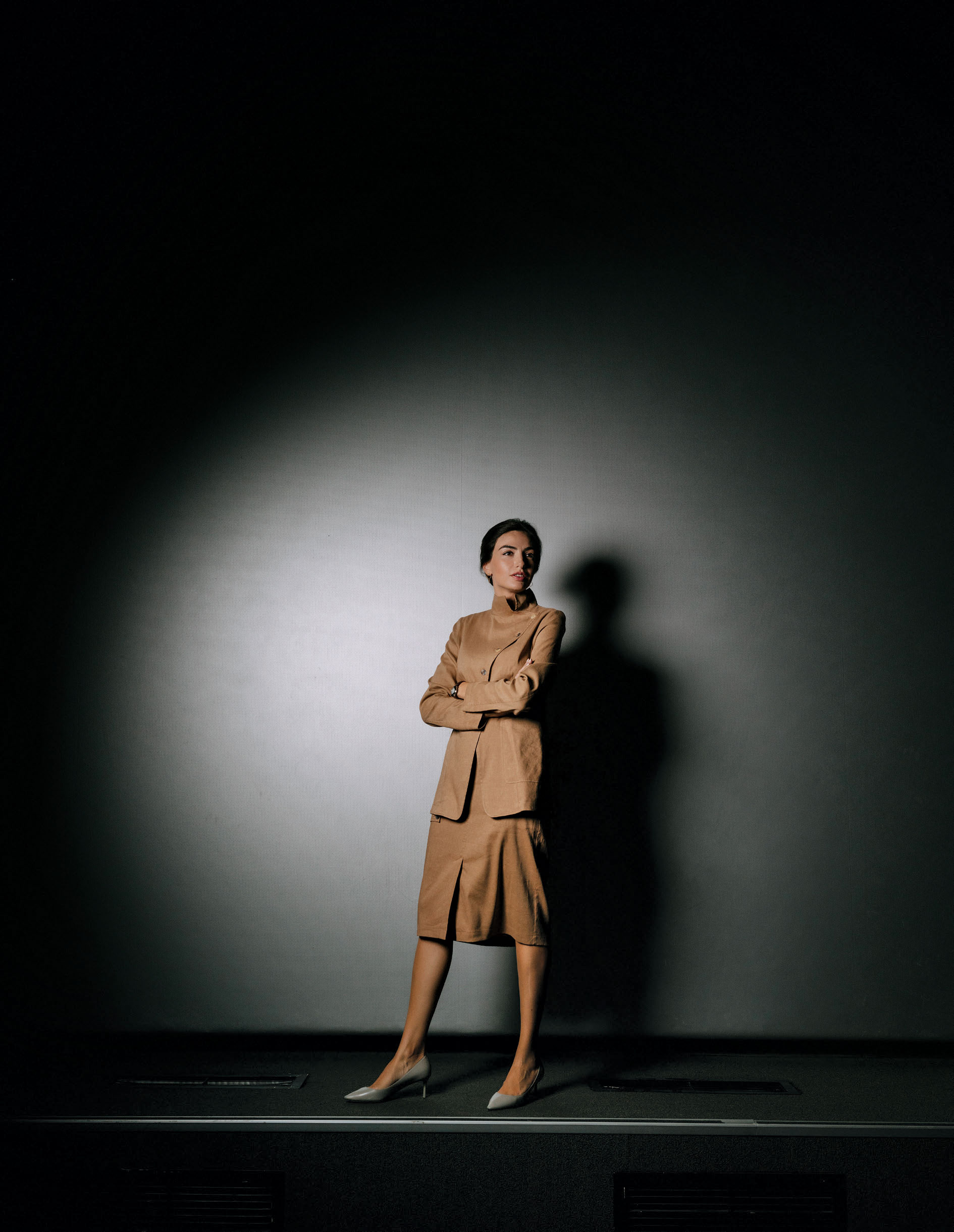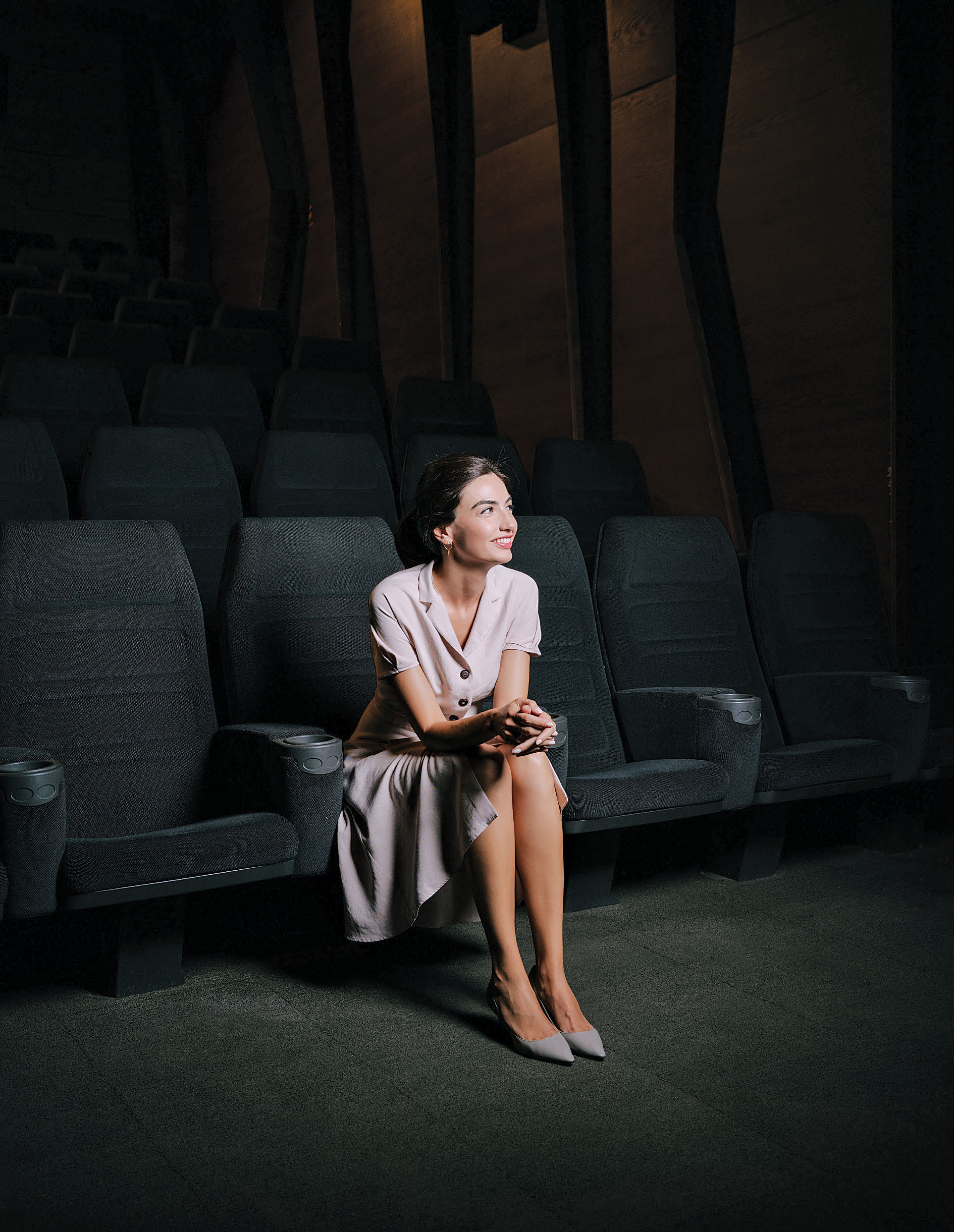Tamara Tatishvili says that her entry into the world of cinema was driven by her passion for the art form and informed by a sharp self-awareness of her own ambitions. When the time came for her to choose a career, she broke with her family’s medical tradition and decided to shape her own destiny. With an undeniable love of film, Tamara instead decided to find a way into the cinematic world.
From 2010-2013, Tamara was the Director of the Georgian National Film Center. It was under her leadership that numerous important reforms were introduced, which resulted in the discovery of many young talented directors and the creation of critically acclaimed works of modern Georgian cinema. After the end of her tenure, Tamara was awarded the special status “Chevalier Ordre des Arts et des Lettres” by the French state to recognise her influential and impactful work.
Since 2014, she has been working as an independent consultant outside of Georgia and is involved in various international film initiatives, including being the Head of MEDICI – Film Funding Journey, a vocational training program for senior leaders of public film institutes and agencies.

Tamara, what determined your professional choice?
I was a child of the 1990s. I grew up in a family of doctors, so no one ever doubted what professional path I would take. Instead, they were more interested in which specific direction I would take in medicine. Although it was a tough time in Georgia, my father often took me to the cinema – mostly in half-lit halls, where there were often syringes under the seats… In spite of this, the appearance of the first shot on the screen felt like a celebration – as if some journey was about to start. Now I realise I have always been interested in the power of images, although, at the time, it was still on a subconscious level. I was particularly interested in the processes involved in filmmaking, but back then, I didn’t know the technicalities or the answers I needed.
We grew up in the context of the Soviet legacy, so the film education we were given about it was still very systemic: vertically integrated production, a controlled process, and then long-term stagnation in the cinema sector.
In the tenth grade, I went to the family of my mother’s closest friends, who had immigrated to America. I already had a clear interest in films and visual storytelling, but I can’t say that I knew exactly what role I saw myself in at that time. Back then, I probably wanted to work in production. However, I didn’t even know what it meant to be a producer. How could I have known? We had grown up in a completely different system.
On the campus of UCLA in Los Angeles, I accidentally got my hands on a brochure where the Faculty of Entertainment and Media Law was mentioned. It was then that I discovered an essential industry and legal side to the audio-visual landscape. After a year, I came back and told my parents that I wanted to attend law school. It was quite a shock for the family. My grandfather, Guram Tatishvili, was a famous surgeon. He was out of town at that time. The last hope for the family was that Guram would come back and maybe change my mind. Grandpa arrived and said, “It’s true. How many doctors can there possibly be in the family of Tatishvili? My first grandchild should be the next Margaret Thatcher!” That generation had different sentiments about Margaret Thatcher; in their eyes, she was seen as a strong leader. In short, in such a strange and amusing way, I became the first Tatishvili to betray the medical tradition and choose an “uncertain” professional pathway. I entered law school and became interested in intellectual property law. I thought I was moving closer to the commercial and industrial side of the audio-visual field.
Were you still interested in cinema?
I have always been interested in cinema. I knew then that being sentimental about the Soviet model was a mistake. It was a thing of the past, and it was necessary to understand the future, progressive models of supporting audio-visual production. However, I didn’t know the alternative to the Soviet studio system. This path – the first step in forming the embryonic stage of the Georgian film industry – was taken together by my generation. We didn’t have the luxury of time just to study theory. It was as if we were studying together and simultaneously doing work. Here, first of all, I am referring to the producers, including, for example, Vova Kacharava, Levan Korinteli, Guka Rcheulishvili, Zura Magalashvili, Tina Kajrishvili, Keti Danelia and many more who advanced and created uniquely different careers in production from each other. In the end, the likability of cinema is a matter of creative, subjective, and professional points of view – but the correct and continuous development of the sector requires an understanding of the industry strategy, the existence of a clear state vision, and the formation of targeted financing schemes. Back then, we did not know any of this in detail required.

What was your first job?
After graduating from university, everyone thought I would choose constitutional law, but that didn’t happen. At that time, I worked in one of the first and very successful law firms “Kordzadze & Svanidze – lawyers.” Simultaneously, the media holding “Imedi” was created, and they needed a young staff well-versed in the legal landscape. The formation of various holding subsidiary companies and the purchase of existing TV studios was underway. This is how I became a lawyer in the company “Studio Audientsia,” which was acquired by the holding company, and in turn, the production of the first Georgian TV series started.
At that point, such directors as Zaza Khalvashi, Zaza Urushadze, among others, had started filming TV series. I was intensively involved in the processes of making “Tskheli Dzagli” and “Mglebis Khorumi.” An exciting process began – assembling films in the edit, collaborating, forming relationships and innovating at every stage. Now I realize that those years were also crucial for me. I was, in a way, observing the slow yet important return of creatives to the cinema. I often remember one moment – the exceptionally talented director, Zaza Khalvashi, composer Irakli Charkviani and I were sitting in the editing room watching the same scene with and without music. Suddenly I saw Irakli burst into tears and hug Zaza. “This is it – we are about to start something big,” – he said. I think such moments define the idea of progress and make you believe everything will work out. The names of these two people always remain synonymous with talent and progress for me.
The same period coincided with the announcement of the “AVANTI” training proposed by the Swiss Development Agency and organized by the FOCAL (Switzerland). The main goal of this organization was to facilitate the resolution of the political conflict in the South Caucasus. The purpose of the training itself was for the Georgian, Armenian and Azerbaijani participants to learn how the European cinema industry was regulated. To learn how European films were developed, produced, and distributed, what was meant by industry development, and so on. Along with the groups of directors and producers, there was also a number of lawyers. I got into this group with Giorgi Ovashvili’s encouragement. I remember he came to me in the office of “Studio Audientsia”, gave me the program’s brochure, and said – “I think this is a perfect place for you. You should apply.” After “AVANTI” I haven’t left the film industry – it’s still the same, only the professional point of view and where I reside have changed.
We went through a one-year training programme with different tutors mentoring us from all over the world. We have been friends with some of them for years now. At the end of the year, the representatives of all three countries said we learned how much we didn’t know. We weren’t less talented than anyone else and didn’t have fewer opportunities – we just came from a different context, and understanding schemes based on creative freedom required time and a broader knowledge of the full context of European film politics. I think we came to at least one correct conclusion: we should not break up the group after the training finished because that would stop the self-exploration that had already started.
For the first time in the post-Soviet space, we created the “Association of Independent Filmmakers – the South Caucasus” (IFASC) founded by Armenian, Azerbaijani and Georgian professionals. I was also one of the founding members and the first director of the association. I managed three offices in Yerevan, Baku, and Tbilisi at a relatively young age. It was the most exciting period for me, with a clear goal. Many of today’s successful Georgian directors and producers participated in the activities proposed by IFASC.
A purpose for me was, and is, contextualising Georgian cinema in the landscape of European cinema. Our main task was to conduct advanced professional training in various areas during that period. Without a doubt, I can tell you that more than fifty percent of the young faces of today’s film industry are people who have been involved in “IFA-SC” in some way. Time has demonstrated this, which is interesting to consider.
As our country was going through a political reorganization, similar processes were happening in our field. Some processes were thoughtful, and some were instinctive, very typical of real life.

How did you get to be the director of the Georgian Cinema Center?
I have had various types of cooperation with the National Cinema Center since its creation. The memories related to the period of Zaza Urushadze’s directorship are significant to me. I remember he used to joke, “I am now the Minister of Cinema, but how can I work in an organization based on the French model within the reality of Georgia – that is cinema too!” After IFASC, I went to London for a Master’s degree in film and television production, and then I started work in a consulting company in the cultural field, BOP Consulting. I wasn’t thinking about returning to Georgia so soon, but it so happened that I received an offer from Nick Rurua, who was newly appointed as the Minister of Culture. He asked me if I was interested in taking over the leadership of the center. For a while, I thought that leaving would mean rearranging the newly constructed life, but I realized that I was interested in determining the history of this institute for the next few years and that I could make some interesting changes. So I accepted the offer. Change is always exciting. Once again, I packed and returned to Georgia.
After all, a person constantly makes choices in life. And so it is in the profession. There is a point where you either become a part of an existing system or take a more significant challenge and start assembling a system: for me, this is also, in a way, producing work. Well-defined film policy is critically vital because European cinema exists at the behest of a well-thought-out state policy and appropriate funding. Without this, auteur cinema cannot survive. Creating adequate and necessary financing and distribution schemes for the existence of auteur cinema is a fascinating process, and it captivates me to this day. In general, working on strategic development projects is my choice, and I have accumulated valuable experience working with various international institutions. In the early years, I would not have had such a clear vision as I have now, nor be able to assess different types of film development strategies or industry visions. The directorship of the Cinema Center was also a specific part of this professional path – the story of forming a large-scale vision of this institute. The enthusiasm and team spirit of the vast majority of the people I worked with was also great motivator. Many things were borne out of our team’s vision, but many plans did not work out. There is one eternal rule – if you are the leader of an organization, you must ultimately be prepared to make a wide range of decisions that are sometimes unpopular, sometimes painful, often right and justified, and, most importantly, always an integral part of a unified, larger vision. Looking at the bigger picture is important – when I start a new project or assemble a new team, these are always my first words, a kind of mantra and inspiration for the team.

What does Georgian cinema need today?
Today, Georgian cinema needs a complete revision of its forms of state support mechanisms, critical analysis, and a more proactive policy. Georgia is no longer the region’s so-called leader, which it was from 2013-2017. This is a fact. Therefore, new tactics and specific steps should be planned from this perspective. On the other hand, Georgian cinema is no longer an unknown entity at the international level. Expectations are high. And that means more funding is needed on the ground, more exciting stories need to be discovered, and many more filmmakers need to be visible. What is the vision for the further development of the Georgian film sector? This question needs to be answered. Agreement, reconciliation, and action are needed. While Georgia does not have these answers or plans, many of our direct competitor countries are developing and moving forward. It’s hard for me to watch, but it’s a fact.
Is there a film you especially love that changed your perception of cinema?
I can’t say for sure. For me, the main magic of cinema is when the lights go out in the auditorium, and you suddenly become part of another story. Then this story is so powerful that you will completely forget where you are. The screen blinds you. For me, this is the primary emotion, and I love all films that make me feel completely immersed. Classics, new movies, drama series – the main thing is to escape reality. I read many scripts of different genres. I was a representative of Georgia at the Council of Europe Film Fund for nine years. Hundreds of projects passed through my hands. Reading these scripts made me especially fall in love with Nordic cinema. I also never limit myself to watching social-realism cinema, which seems to be a bit of an excessive trend in auteur cinema. I like to discover films of different genres and forms. In particular, political thrillers are really attractive to me, and I think I might want to focus on this genre someday.
When you work in this field, there is a very thin line between your daily and professional life. This is not an hourly job. You must deal with people, their stories, and hidden inner weaknesses. You become a part of the creative chaos. That’s why I need to feel very comfortable within this chaos. This is my professional peace of mind, which I always need. Two factors are decisive in this regard: never question creative independence because independence and freedom are the most important in everything. Second: the manner of visual storytelling should be personal and authentic. When you become a part of the microcosm created by the author and you don’t want to leave the screen, this is the greatest pleasure that cinema brings.
What is the purpose of cinema today, and does this purpose differ from country to country, from society to society?
Everyone can assign purpose in their own way. The main power of cinema is that it can make you see what you can’t see and feel what you haven’t experienced before. Perhaps the purpose is to broaden one’s outlook: to raise new questions, empathize, or think more. Documentary cinema has a particularly educational role in this regard.
Cinema is also a weapon; it travels very quickly, moving from screen to screen faster than many politicians and telling a story to millions of people. Therefore, the existence of European cinema and the stated importance of its preservation emphasizes another purpose of it – it promotes the expression of cultural diversity through specific film narratives.

The forms of distribution of cinema have changed a lot. Today, when we live in a digital reality, and the algorithm dictates many viewing trends, the boundaries between the viewer and industry are blurred. The audience watches the movie on any screen, mobile, airplane, etc. This leads to significant changes to the business model, and I must focus on this while working on many projects. However, whatever the model is for future premiere screenings, festival and online distribution networks, and other essential business elements may be, the main purpose of cinema is to make people think.
What is the role of women in the modern world of cinema? Is it different from the male role? How noticeable is the difference to the audience when there is a woman or a man behind the camera?
Today, this is one of the most critical topics actively discussed in the international film industry. I worked for three years as the Strategy Manager of the “European Women’s Audiovisual Network”, and I am pretty familiar with the problems in this area. For me, the issue is specific – in the last six years, there have been enough statistics that clearly show many obstacles created for female professionals, ultimately leading to their continued underrepresentation in the audio-visual field. Studies have also shown that in Europe, the share of female and male directors is almost equal after receiving a university education, but women are already “disappearing” at the next stage of production, that is, the first films. There are many reasons for this. Social constructs such as family care duties, the inequalities of salary and the need to earn money to survive, the complex issue of “machoism,” and many other harsh constraints place women in a non-competitive position or, even worse, make them invisible.
The second issue is the stereotypes of female characters: this topic is often discussed, and programs are created with a particular emphasis on creating multifaceted female characters.
In the case of Georgia, in my opinion, it is the female directors who have worked on the most captivating stories. They have created interesting female characters and boldly showed us their world. They are undeniable leaders for me!
I think we all know that patriarchal approaches are still very dominant, and I have seen many people who do not support the discussion around gender equality. The motive seems to be that talent is the main thing, not the gender of the author. This is just an infantile approach and part of a bigger problem. Historical context and statistics clearly show that there is a whole raft of obstacles created for women that are not there for men.
The process of advancing the role of women in the film industry has begun. Numerous programs are being created with the aim of making the vision of the female director and the narrative more relevant. This process is likely to be unstoppable and will gradually involve the advancement of more female screenwriters, producers, cinematographers, and other professionals. I think that the era of women has started.
